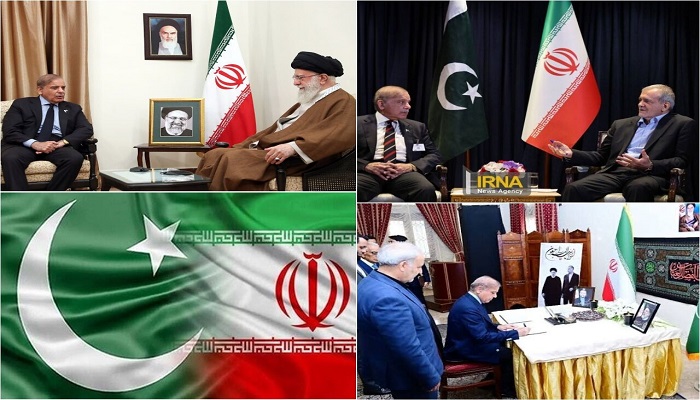PNN – The calendar of unbreakable relations between the Islamic Republic of Iran and Pakistan witnessed new blossoms in each other’s friendly relations and the opening of new avenues of cooperation in the diplomatic, economic, military, and cultural fields.
According to the report of Pakistan News Network, the formation of new governments in the two countries, the visit of the late Iranian President to Pakistan, increased exchange of high-level delegations, opening new avenues of cooperation in the defense-military fields, and a shared determination to boost the volume of joint trade are among the most important events in Iran-Pakistan relations in the past year.
The late Iranian President Seyyed Ebrahim Raisi chose Pakistan as his first foreign destination early last year. The visit came after Pakistan held general elections and formed a new government in the neighboring country.
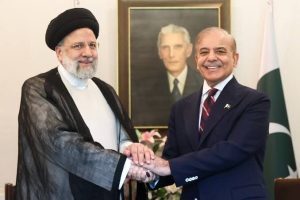
At the same time, the leaders of the Islamic Republic of Iran and Pakistan, who do not miss any opportunity to meet, discuss, and renew friendly relations between the two neighboring countries, once again held bilateral meetings with each other, so that this meeting would serve as another golden leaf in the friendly relations between the two neighboring countries and a valuable conclusion to the calendar of bilateral relations in the past solar year.
Over the past year, the two countries have witnessed an increase in the exchange of political, diplomatic, military, economic, and cultural delegations, in a way that these visits have paved the way for further expansion of relations in all fields.
Read more:
What did the Arab media write about the Supreme Leader’s statements in his Eid al-Fitr sermons?
The most important political development in Pakistan this year was the holding of general elections and the formation of a new government led by Prime Minister Shahbaz Sharif. After that, an increase in the exchange of high-ranking delegations, including the official visit of Martyr Raisi, the visit of the Prime Minister of Pakistan to Tehran, two visits of the Foreign Minister of Pakistan to Iran, the visit of Dr. Seyed Abbas Araqchi to Islamabad, as well as two bilateral meetings of the Prime Minister of Pakistan with Dr. Masoud Pezishkiyan, President of the Islamic Republic of Iran, in New York and Cairo, was registered in the Office of Good Relations between the two neighbors.
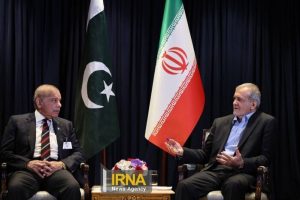
Iran and Pakistan stand united in supporting Palestine
Over the past year, as the Gaza war continued, like the Iranian nation and government, the Pakistani government and people have consistently expressed their support for the Palestinian struggle against the Zionist enemy and their hatred for the Israeli regime’s blind aggression in the region on national, regional, and international stages.
Various cities in Pakistan witnessed large gatherings of Palestinian supporters, and the enthusiasm of the country’s people was evident after two successful “Operations of Promise” by the armed forces of the Islamic Republic of Iran against the Zionist regime.
The Pakistani government, while condemning the Zionist regime’s aggression against Iran, announced that Pakistan stands with Iran. Pakistan also condemned the Zionist regime’s crime of assassinating the martyrs Ismail Haniyeh and Sayyed Hassan Nasrallah and called for immediate action by the international community to stop the Israeli regime’s aggression.
Pakistan was the first foreign destination of the Iranian President last year.
After the new government came to power in Pakistan, the country hosted the late Iranian President as the first high-ranking foreign official to visit Pakistan after the formation of the new government. Ibrahim Raisi concluded his three-day official visit with a warm welcome from the high-ranking officials of the neighboring country in Islamabad, Lahore and Karachi. The two countries also signed several cooperation documents during the visit.
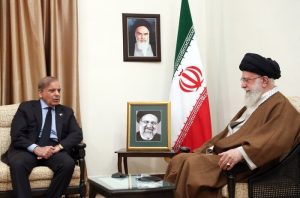
Shahbaz Sharif’s visit to Iran
Less than a month after Ebrahim Raisi’s visit to Pakistan, the tragic incident of the helicopter crash of the president and his entourage hurt the hearts of the people and government of Pakistan, which had recently hosted the late Iranian president. A day of public mourning was declared in Pakistan to pay tribute to Ebrahim Raisi, martyr Amir Abdullahian and their entourage, and the Pakistani Prime Minister traveled to Tehran to attend the ceremony to pay tribute to the martyrs of the service.
The presence of the Deputy Prime Minister of Pakistan at the inauguration ceremony of Dr. Pezishhkiyan
After the Iranian presidential elections, the Pakistani Prime Minister spoke by phone with Dr. Masoud Pezishhkiyan, the elected President of the Iranian nation, and while congratulating him, he announced Pakistan’s full readiness to cooperate closely with the new government of the Islamic Republic of Iran.
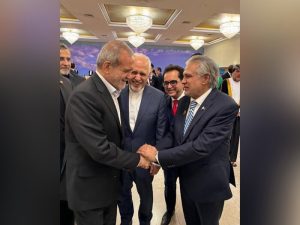
Araqchi’s trips to Islamabad and his Pakistani counterpart to Iran
Abbas Araqchi, the head of the diplomatic apparatus of the 14th government, traveled to Islamabad in mid-November, following the Zionist regime’s aggressive action in Iran, and in the last stage of his regional travels, and met with high-ranking Pakistani political and military officials.
He held separate meetings with the Prime Minister, his Pakistani counterpart Senator Mohammad Ishaq Dar, and General Syed Asim Munir, the country’s army commander.
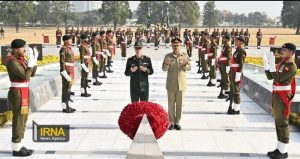
Iran and Pakistan in the military arena: from arms exhibition to international exercises
The exchange of high-level military and security delegations between Iran and Pakistan continued and was accompanied by a significant leap. The Pakistan Navy’s naval group visited the Islamic Republic of Iran twice this year. Also, during the Fajr period, the destroyer Jamaran Nadaja visited the port of Karachi, which was followed by the Islamic Republic of Iran’s first operational presence in the Aman international exercise in Pakistan.
Major General Mohammad Bagheri, Chief of Staff of the Armed Forces of the Islamic Republic of Iran, traveled to Islamabad at the head of a high-ranking military delegation to develop joint cooperation with Pakistan. This important visit was made at the invitation of General Sayyed Asim Munir, Commander of the Pakistani Army, and during which the high-ranking Iranian military delegation met with senior military and political officials of the eastern neighbor.
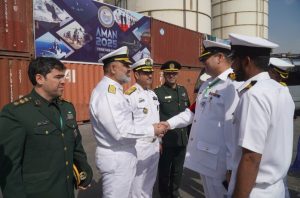
Brigadier General Hamid Vahedi, Commander of the Air Force of the Islamic Republic of Iran, traveled to Islamabad at the invitation of his Pakistani counterpart. He also supervised the holding of the Pakistan Air Force’s multinational exercise called Shield Sindh 2024.
Brigadier General Seyyed Hojjatollah Qureshi, Deputy Minister of Defense and Support of the Armed Forces of the Islamic Republic of Iran, led a military delegation during an official visit to Islamabad to meet with high-ranking Pakistani defense and military officials.
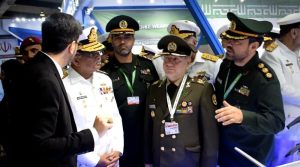
Pakistan on the domestic front: from fighting terrorism to trying to improve the country’s economy
Pakistan witnessed many ups and downs internally and in its relations with various countries. The continuation of severe tensions in relations with Afghanistan and India, and efforts to repair relations with the United States despite Washington’s negative stance against Pakistan’s missile programs, as well as the challenge of the Shahbaz Sharif government against the opposition while managing the economic crisis, were among the important events in Pakistan.
Citing fruitful negotiations with the International Monetary Fund to advance lending to Pakistan, the Shahbaz government reports a relative improvement in the country’s livelihood, strengthening the foreign exchange market, attracting foreign investments, and also reviving the domestic labor market.
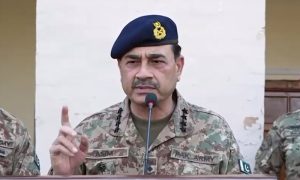
Pakistan maintained its neutrality in the Ukraine war while continuing to develop relations with Russia, a policy that did not please the Americans and their anger can be seen in the form of statements issued against Pakistan’s internal developments, especially the repeated imposition of sanctions against Chinese and Pakistani companies and Pakistan’s missile programs.
After Donald Trump’s victory in the US presidential election, and given Islamabad’s history with the previous Trump administration, it is expected that the complexity of these relations will increase under the new US administration. However, Trump appreciated the Pakistani government’s cooperation in arresting the ISIS perpetrator of the Kabul airport attack.
At the same time, the US government’s stances against Pakistan’s missile programs and comments on political developments and the conflict between the government and the opposition in Pakistan have angered the country’s officials.

